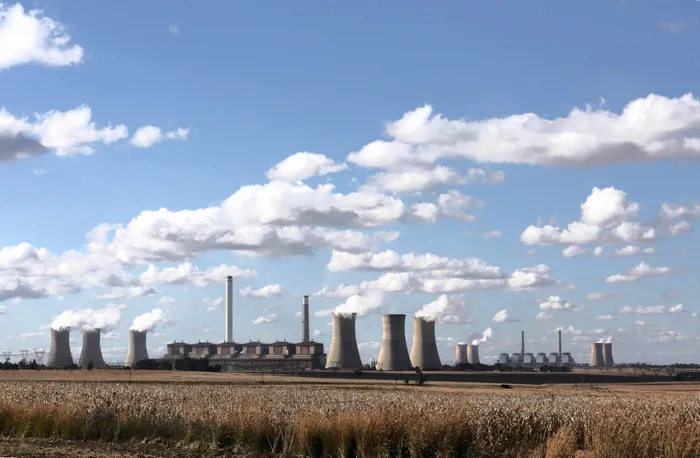
The writers explore the intersection between South Africa’s electricity crisis, its socio-economic impacts, climate change, and the growing demand for environmental justice.
Image: Siphiwe Sibeko/ Independent Newspapers
The connection between South Africa’s electricity crises, socio-economic strains, climate change, and environmental justice has become profoundly apparent to us all in recent years. This connection necessitates that the Government and Eskom actively pursue strategies to ensure that South Africa’s Just Energy Transition (JET) does not result in abandoned, extremely polluted environments, sometimes referred to as 'ghost towns'. The decommissioning of power stations is an essential consideration in these strategies.
In essence, the decommissioning of power stations refers to the process of shutting down a facility when it has reached the end of its operational life or when it is closed for any other reason.
When a power station reaches its lifespan, it cannot simply be abandoned without an attempt at site repurposing. This is crucial because power stations rely on thousands of employees for their operation, and these individuals rely on those jobs for their livelihood. Furthermore, the air, land, and water pollution caused by the facility’s operations during its lifetime must be remedied upon closure.
There must be a clear plan with measurable actions to provide economic and financial security to the workers employed by the power stations and to rehabilitate the environment negatively impacted by the operations. Decommissioning a power station cannot be an arbitrarily rushed process; it requires a strategic, intentional plan guided by the law. Most importantly, communities situated close to power stations must be meaningfully engaged as early as possible and be central to the entire process.
On 16 July 2025, Eskom briefed the Parliamentary Portfolio Committee on Electricity and Energy on its updated JET strategy. During this session, Eskom presented the decoupling of power station decommissioning from the JET framework. This means the transition will no longer be directly linked to the decommissioning of old coal power stations, but will instead be treated as two separate processes.
This raises serious questions, including the fundamental query: if decommissioning is not an integral part of the JET plan, will there be structured support for coal workers and their communities to transition into new opportunities?
In 2019, as part of its Integrated Resource Plan (IRP), the Government set out decommissioning dates for various Eskom power stations. One of these was the Komati Power Station, which the IRP expected to be fully decommissioned by 2023. Consequently, the last operating machine at Komati was shut down in October 2022.
Since there is currently no law or formal policy in South Africa that regulates or provides guidelines for the decommissioning process, Eskom largely decided how Komati was retired, within the confines of general environmental and safety rules.

The writers explore the intersection between South Africa’s electricity crisis, its socio-economic impacts, climate change, and the growing demand for environmental justice.
Image: Siphiwe Sibeko/ Independent Newspapers
While various consultations with stakeholders, communities, and employees affected by the decommissioning were reported, the absence of a law or policy makes it difficult for workers and affected communities to hold the facility accountable for the adequacy of the process followed.
The Presidential Climate Commission (PCC) began engaging with the Komati community and workers in January 2022 as part of developing the national Just Transition Framework. During these consultations, concerns were raised about the closure and repurposing of the Komati Power Station, particularly regarding the ‘justness’ of the process.
It was revealed that:
The community was consulted late in the process and excluded from providing input on key decisions directly impacting them.
Only permanent staff were protected, while many others, including contract workers, local businesses, and informal workers, were left out.
Delayed job creation led to deepening poverty, inequality, and gender-based violence.
The lack of transparency and access to clear, timely information shattered trust.
The PCC’s 2023 “Early Lessons” report captures these hard truths. Komati serves as a clear example of the economic and environmental insecurity caused to communities when the decommissioning process lacks a binding framework.
The socio-economic circumstances and the environmental state of South Africa require that decommissioning processes and guidelines must be given legal force and not be left to open discretion. Power stations must be legally required to prepare and implement decommissioning and repurposing plans that will not leave affected communities economically suffocated with no jobs.
Furthermore, it should be expected that these plans do not compromise the physical environment and eco-systems of the affected communities. The role and consideration of the communities must be pivotal to these processes—communities must be thoroughly consulted as early as possible.
Principles of restorative and distributive justice demand that community needs are always prioritised in government plans. This is why there must be a law that regulates the decommissioning of power stations in South Africa—a forward-looking law that not only prioritises recovery from the current electricity crises but also ensures a justiciable decommissioning standard is created.
The PCC’s 2023 “Early Lessons” report, based on its own consultations, makes a crucial point: a “just transition” is impossible if communities are brought in as an afterthought.
Ntombi Maphosa is an attorney for the pollution and climate change programme at the Centre for Environmental Rights. Pettavia Madibana is a candidate attorney at the Centre for Environmental Rights.
Eskom is due to decommission seven more of its power stations by 2030: Acacia, Arnot, Camden, Grootvlei, Hendrina, Kriel, and Port Rex.
For five of these, Eskom is required to submit detailed decommissioning plans to the Minister of Forestry, Fisheries and the Environment. While this is a step in the right direction, it was merely based on a ministerial directive resulting from a decision, not an officially recognised law or policy. This means that when other power-generating facilities must decommission, they will not be bound by any legal framework to follow a standardised process or prepare detailed plans.